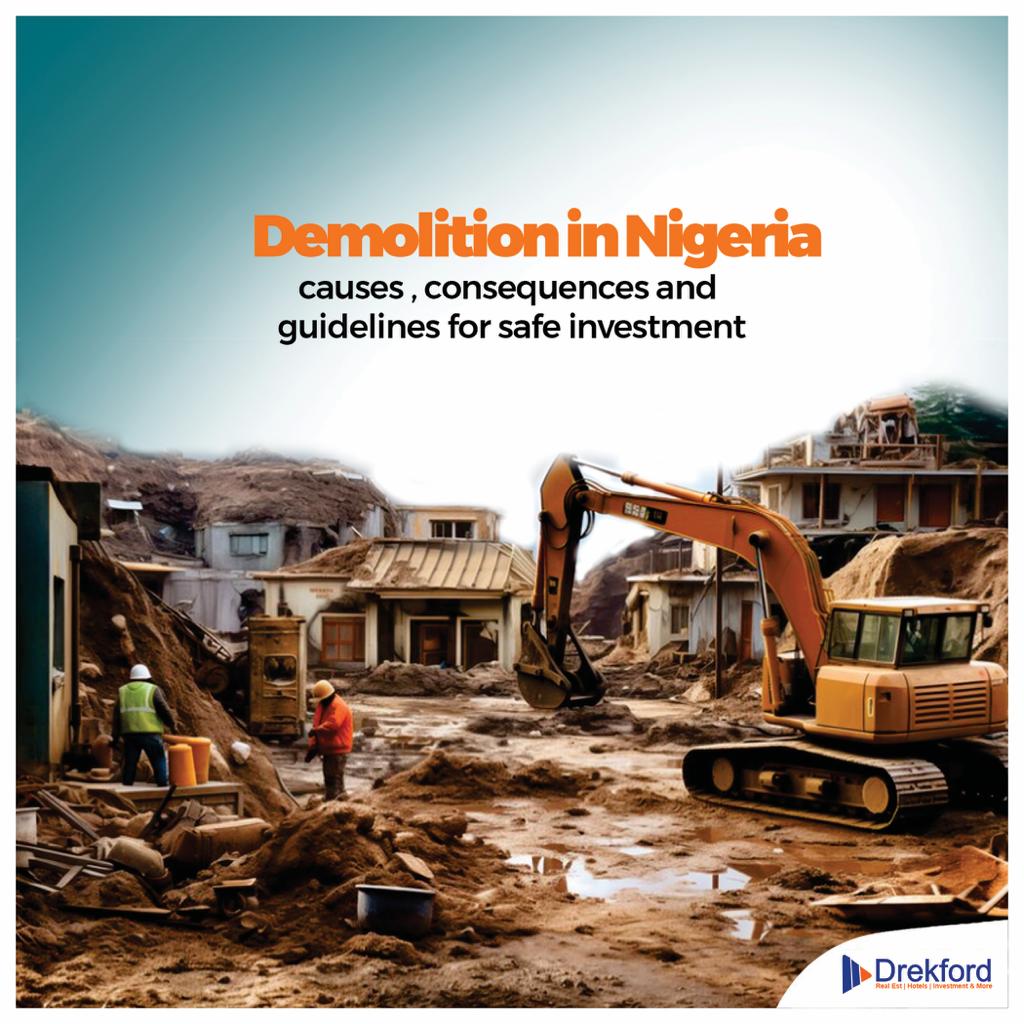
INTRODUCTION
Demolition in Nigeria is a recurring phenomenon, often undertaken by the government for various reasons. The government’s actions, while aimed at addressing certain issues, have profound effects on the economy and the well-being of the country’s citizens. This article explores the causes of demolition, its advantages and disadvantages, and offers valuable insights for prospective land and property buyers to avoid falling victim to these circumstances.
Causes of Demolition
- Urban Renewal: One of the most common reasons for demolition in Nigeria is urban renewal. As cities grow and evolve, outdated or dilapidated structures need to be replaced with modern buildings and infrastructure to meet the needs of a growing population.
- Illegal Structures: The government often takes action against illegal constructions that violate zoning regulations, and building codes, or encroach on public land. These unlawful structures are often unsafe and disrupt urban planning.
- Infrastructure Development: Demolition may be required for the construction of new roads, bridges, airports, or other public infrastructure projects that serve the greater good.
- Environmental Concerns: Demolition can also be driven by ecological concerns, such as the removal of structures in flood-prone areas, conservation of green spaces, or dealing with health hazards.
Advantages of Demolition
- Improved Infrastructure: Demolishing old structures can make way for improved infrastructure, including better roads, public transportation systems, and urban planning, which can contribute to economic growth and a higher quality of life.
- Urban Beautification: Demolition allows for the removal of unsightly structures and slums, contributing to a cleaner and more attractive urban landscape.
- Safety and Public Health: Eliminating illegal structures or those that pose safety risks can enhance public safety and health.
Disadvantages of Demolition
- Displacement: One of the most significant drawbacks of demolition is the displacement of residents and businesses, often without adequate compensation or suitable alternative housing.
- Economic Impact: Demolition can disrupt businesses and local economies, leading to job losses and reduced economic activity in the affected areas.
- Loss of Cultural Heritage: Some demolitions may destroy historical or culturally significant buildings, leading to a loss of heritage and identity.
Guidelines for Safe Investments
To avoid the risk of property demolition and associated losses, here are some guidelines for prospective land and property buyers in Nigeria:
- Land Title Verification: Ensure that the land has a valid and verifiable title. Engage legal experts to conduct due diligence to confirm the authenticity of the land documents.
- Zoning Regulations: Familiarize yourself with the local zoning regulations and building codes in the area where you intend to buy property. This will help you avoid investing in areas where your property may be at risk of demolition.
- Consult Local Authorities: Visit the local government or municipal authorities to inquire about any planned or ongoing urban renewal projects in the area.
- Environmental Assessment: If you plan to buy land in environmentally sensitive areas, consult with environmental experts to assess potential risks and regulations that might affect your property.
- Regularize Documents: If you’re purchasing land with pre-existing structures, make sure all necessary permits and approvals are in place. If the structure is illegal, consider negotiating with relevant authorities to regularize it.
Conclusion
Demolition in Nigeria is a multifaceted issue that has both advantages and disadvantages. While it can lead to improved infrastructure and safety, it can also result in displacement and economic challenges for affected individuals. Prospective land and property buyers should exercise due diligence and follow the guidelines provided to avoid investing in areas at risk of demolition, ensuring their investments are secure and contribute positively to the country’s development without negative consequences for the well-being of its citizens.



